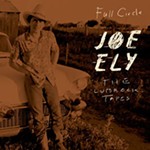Letters at 3am: Joe Ely's Reverb: An Odyssey
The road goes on forever, and there's never a destination
By Michael Ventura, Fri., Sept. 19, 2014
"Great times up in West Texas. I have some great memories up there. It's a very romantic place – if you've just gotten out of the pen. [Laughter.]
"Everybody loves to give Lubbock a hard time, but, you know, Terry Allen made the observation that, although he's cussed that area all of his life, he says whenever he starts a song it always begins there. And I do, too. When I start a new record or somethin', I always go up there and just drive those lonesome roads. You can see forever. Nothing gets in the way."
That's Joe Ely at an Austin gig, introducing a West Texas song.
In Ely's new novel, Reverb: An Odyssey, published by our LettersAt3amPress, he comes at West Texas from another direction: "He thought about the pioneers who came seeking freedom and found so much of it they couldn't handle it."
That paragraph continues: "He thought about his granddad Morgan who had arrived on the High Plains sixty years earlier and who had probably thought the same thoughts while watching the dust blow everything away that was not nailed down. ... Earle indeed wondered what kind of blind faith would lead all those nameless pioneers to expose themselves and their loved ones to the vast West Texas uncertainty. He thought about how the eyes of the old people seemed to always be gazing over the edge of the horizon."
I live in Lubbock. I'm growing old in the neighborhood where my friends grew up. Sometimes I tell visitors, "Look at the trees. As you drive this town, notice the trees. Think of those trees 50, 60, 70 years ago. Most of them didn't exist. The Lubbock of Joe Ely, Terry and Jo Harvey Allen, Jo Carol Pierce, Butch Hancock, Jimmie Dale Gilmore, Eddie Beethoven, Lloyd Maines – their Lubbock was barren and exposed. Every road in and out was a two-lane. Every street led straight to the horizon."
Reverb tells it as I've heard it: In the Lubbock of the Fifties and Sixties, the cops were at war with the young. Long hair on a boy could ignite violence. Sin was strong but furtive and hunted. Righteous pretense was rife. And most of the fathers, grandfathers, and great-grandfathers were veterans or casualties of some war. A line in Reverb: "[T]he hard steady wind brought everything back to its normal state of static chaos."
Static chaos: normal life.
"Earle decided then and there to leave this town of sleepwalkers and go out into the world[.] ... [L]eave this sad town and see if everywhere was as haywire as this."
Haywire is all Earle finds anywhere – the road, Fort Worth, Dallas, Houston, Los Angeles, and Route 66. He realizes "that perhaps all the writings he had written of the sleepwalking masses should have, in all reality, been addressed to himself. Was it not true that the emptiness he had been seeing in others, was in truth a part of himself?"
Joe Ely's music has always been a music of over-the-edge lives. Carny dreamers, pool hall heroes, Indian cowboys, migrant pickers, jailbirds, strippers, preachers, drivers of dynamite trucks, broke farmers, drug dealers, cockfighters, crapshooters, thieves, railroad yard hobos, brokenhearted mothers, the occasional gunman, the occasional gunwoman, poker players, gypsies, Little Maggie, Big Earle, cops who have it in for anyone who's not a cop, and waitresses who never, never, never say, "My name is Tiffany and I'll be your server this evening!" – not to mention Annie, Cheri, Loretta, Maria, Caroline (pronounced Carol-een), Madame Wo, Preciosa, Daisy-O, and that madwoman Isabella, plus Pancho Villa, Billy the Kid, Saint Valentine, the Crazy Lemon, the Queen of Heaven, and the Queen of Spain (with whom Ely was locked in a boxcar in a song now impossible to find).
You need to know that gritty world firsthand to write it with the immediacy vibrating on Reverb's every page. Ely sang it in "Letter to L.A.": "The poor lost souls in the shadows/ You forget: They're friends of mine."
They come and go in Reverb, sometimes up to no good, usually in some kind of trouble, and some just for the hell of it, but all are game – because you don't last a week in that world if you're not game. That's part of the book's sense of thrill.
Ely digs that over-the-edge needn't mean lost: "Something about the way the juniper trees rubbed against the ivy shifted his thoughts to his great-grandfather Sullivan. His brutal Irish wit bewildered the adults and charmed the children. He created havoc with his light-heartedness and was the talk of family reunions from Dalhart to Little Rock. He was known to sip from a flask (gasp!) and sing Irish folk songs with the children for hours at a time. Somehow he seemed to be immune from all things dreary and/or boring. He survived the curses from each side of the family and lived to be 98 years old. He mocked self-righteousness and self-pity in any form or fashion. He had that eternal sparkle in his eyes that revealed to some his fully-realized nature. To others, the sparkle was a mirror that reflected back to them their own wretched being."
Reverb's year is 1965, and Earle, a high school dropout, has just turned 18 and registered for the draft. Better than any book, song, or movie I know, Reverb conveys the Vietnam-era dread of young working-class men who were liable to be yanked off to war or forced to face the prospect of resisting the world's most powerful government. In the war's first years, college kids got an automatic deferment. But working-class guys like Ely and me, who, for one reason or another, didn't or couldn't go to college – we were cannon fodder. They threw many thousands of us into that war and 50,000 of us didn't come home. Reverb vividly evokes what it was to be caught in your government's grasp, subject to orders to send you in harm's way to a war it has yet to justify.
Reverb's 1965 was the "Summer of Love." You had to be below middle class and/or black to get the absurdity of that phrase. It was one dangerous summer. There was lightning in the air. No one knew why, but everybody felt it – and it pissed some off as much as it made some high. Anything could and did happen, and lots of it really wasn't pretty. Ely gets what was pretty and what really wasn't, and evokes it better than anyone I've read.
Reverb is an odyssey as defined in the Oxford English Dictionary: "a long and eventful or adventurous journey." Some odysseys have no destination. The searcher can't say what he or she searches for, they just pray they'll know it if they find it. Reverb: "He didn't know what the word destination meant at this point in his life." Ely's "My Eyes Got Lucky": "I've got no destination and I'm halfway there."
At one point Earle stops to take a breath. "The last twenty-four hours were symbolic of both everything he had lived for and everything he was trying to get away from. He felt like it was his duty to capture it all, from now on, in story and song."
Did you hear the word "duty"? Peculiar word from a self-confessed rambler. But duty is exactly the call felt by that rare kind of artist who takes upon himself the responsibility of expressing his world as he sees it, celebrating it, damning it, running from and to it, engaging every day with passion and wonder, without which embarking upon an odyssey is pointless.
Reverb: An Odyssey. It really is.
Order Reverb: An Odyssey, print or e-book, at www.lettersat3ampress.org. (If the print Reverb isn't available, try again in a few days.) E-books are also available from Kobo, Kindle, and Nook.











